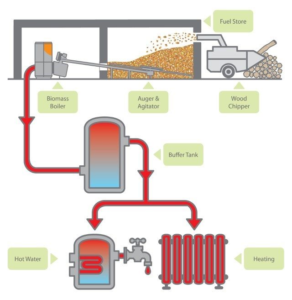INTRODUCTION
WHAT IS BIOMASS?
⦁ Biomass refers to any organic material derived from plants, animals, or their byproducts.
⦁ It can include wood pellets, agricultural residues, dedicated energy crops, and organic waste materials.
⦁ Unlike fossil fuels, biomass is considered carbon-neutral since the carbon dioxide (CO2) released during its combustion is roughly equal to the amount absorbed by the plants during their growth. This makes biomass a sustainable and renewable energy source.
BENEFITS OF BIOMASS AS BOILER FUEL
Renewable and Sustainable:
Carbon Neutrality:
Reduced Greenhouse Gas Emissions:
Utilization of Organic Waste:
Local Economic Development:
Fuel Diversity and Energy Security:

CHALLENGES AND CONSIDERATIONS
Fuel Diversity and Energy Security:
Efficiency and Emission Control:
Supply Chain Logistics:

So, Basically…
You need sustainable sourcing?
Emission Control system for Biomass boilers?
To get rid of Supply Chain Logistic issues?
CONCLUSION
Biomass fuels offer a sustainable and renewable energy solution for boilers, reducing carbon emissions and promoting a greener future. By harnessing the energy potential of organic waste materials and agricultural residues, we can reduce our reliance on fossil fuels, mitigate climate change, and stimulate local economies.
However, it is essential to prioritize sustainable sourcing, employ efficient combustion technologies, and address logistical challenges to maximize the benefits of biomass as a fuel for boilers.
With continued research, innovation, and commitment, biomass can play a significant role in our transition to a more sustainable energy system.

